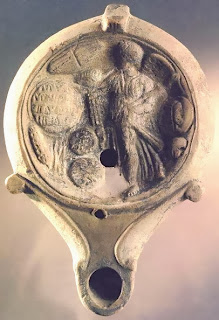 |
| Two-faced Janus |
Like us, the Romans celebrated the new year on January 1st, which they called the Kalends of January or Iani Kalendai. The two-faced god Janus was lord of this day. January is named after him. He is the god of beginnings and ends and his name means "gate" or "door". In times of war the gates of his temple were kept open and in peacetime they were barred.
Here are ten things ancient Romans might have done on the first of January.
1. try to think good thoughts all day long
2. greet each other cheerfully, avoid gossip or negative speech
3. sprinkle saffron on the hearth, as incense
4. sacrifice to Janus before any other god in household shrine
5. join or watch a procession to the Capitoline hill, where
6. priest would sacrifice a heifer and
7. swear in the officials elected to serve in that year
8. do a bit of business
9. give honey, dates, coins to friends, family, patrons, clients
10. pray to the god Janus for peace
We know these things from many places but especially from the Roman poet Ovid, who wrote a whole book on Roman Festivals. This book was called Fasti, which literally means 'a register of public holidays'. Boring, huh? But Ovid knew how to make it exciting.
In the first book he invokes "Two-headed Janus, the only one of the gods who can see your own back..." when the god himself suddenly appears to him in a vision!
Ovid is terrified. He feels his hair stiffen and his bosom freeze but he manages to choke out a couple of questions about the meaning of the festival.
[N.B. The following Q and A is paraphrased]
Ovid: Why do you have two-faces?
Janus: I sit at Heaven's Gate and supervise the comings and goings of everybody including Jupiter himself. I need two faces or I'd get my neck in a twist.
Ovid: Why does the new year begin in midwinter and not in spring when everything is fresh and new?
Janus: Midwinter marks the death of the old sun and the beginning of the new. The year takes its start from that point.
Ovid: It's forbidden to do business or file a lawsuit on most festivals, but not on January 1st. Why not?
Janus: So idleness won't set the pattern for the whole year. Start as you mean to go on. Do a little business.
 |
| Roman honey - a good omen |
Janus: I'm the door and the doorman. You get access to them via me.
Ovid: Why do we wish each other 'Happy New Year!' and say only positive things today?
Janus: Omens are linked with beginnings. On this first day of the year, the ears of the gods are open and your words carry more weight.
 |
| oil-lamp with New Year greeting |
Janus: They are all good omens, ensuring that the whole course of the year will be as sweet as its beginning.
Ovid: I see why sweet things are given, but tell me the reason for the gift of money.
Janus (laughing): How little you know about the age you live in if you think honey is sweeter than cash in hand!
Ovid: One last thing. Why is there a ship on the back of some coins?
Janus: Now you're pulling my leg, aren't you?
HAPPY NEW YEAR!
faustum annum novum (tibi precor)
faustum annum novum (tibi precor)
 |
| The Two-Faced God |
Love the paraphrasing! Must share. Happy New Year!
ReplyDeleteHappy New Year..Love all the Books!|
ReplyDeleteGratias ago, Baz! Faustum Annum Novum tibi precor!
DeleteBene dicta, Carolina; macte tua virtue! %%robert �� �� �� �� @chopin_slut
ReplyDeleteIf they celebrated New Year on 1st January, why were September, October, November and December so named?
ReplyDeleteSeptember, October, November and December were originally months seven (septem), eight (octo), nine (novem) and ten (decem) but got shunted down the line c. 700 BC when King Numa Pompilius added January and February to the year before March, the original first month. In 8 BC Sextilius (month six) was renamed August in honor of Augustus and of course July is named for Julius Caesar.
Delete